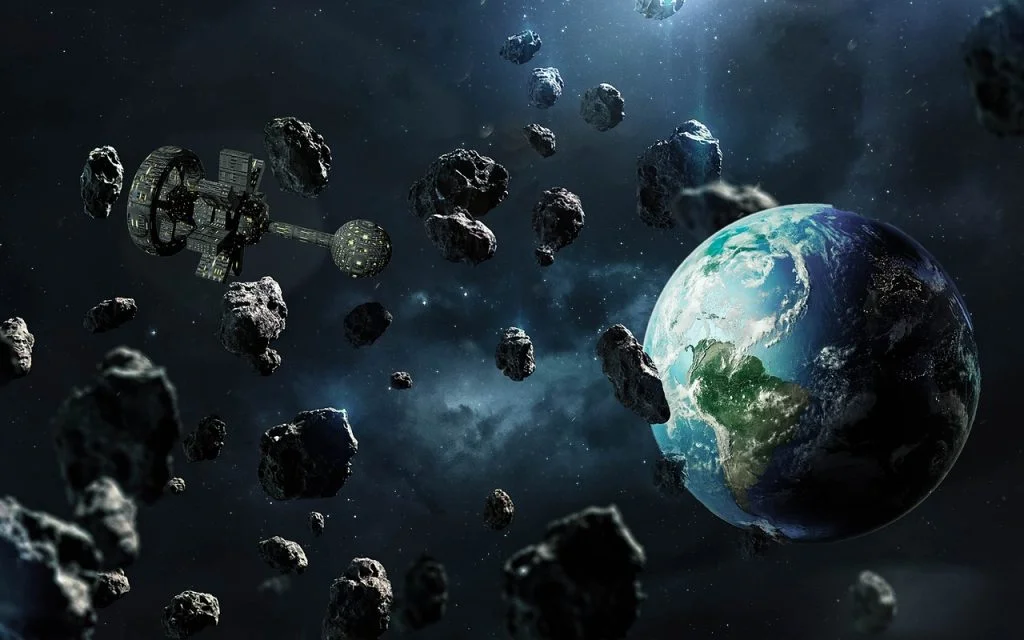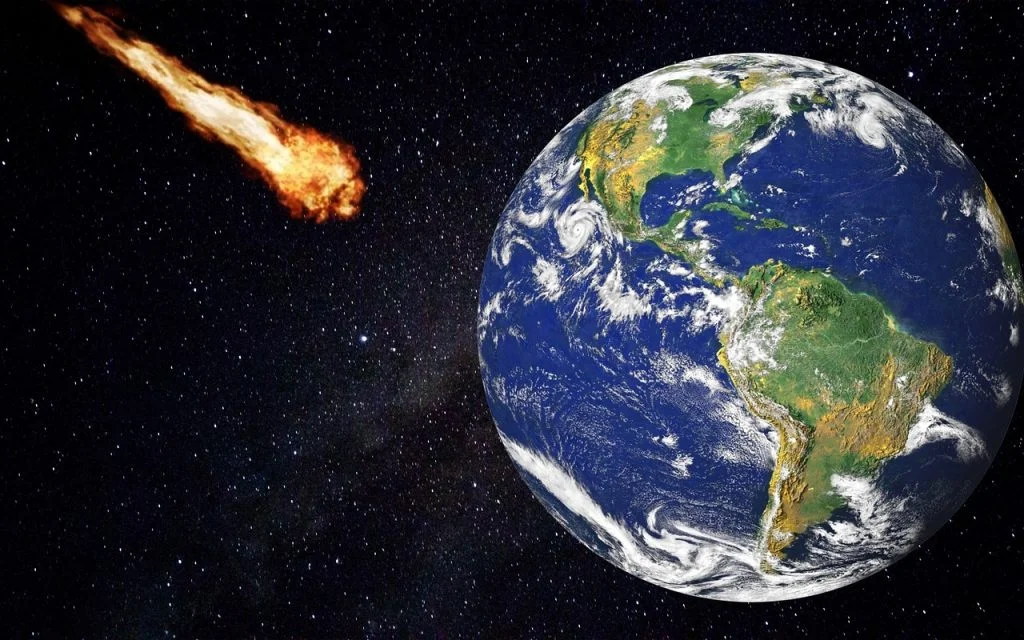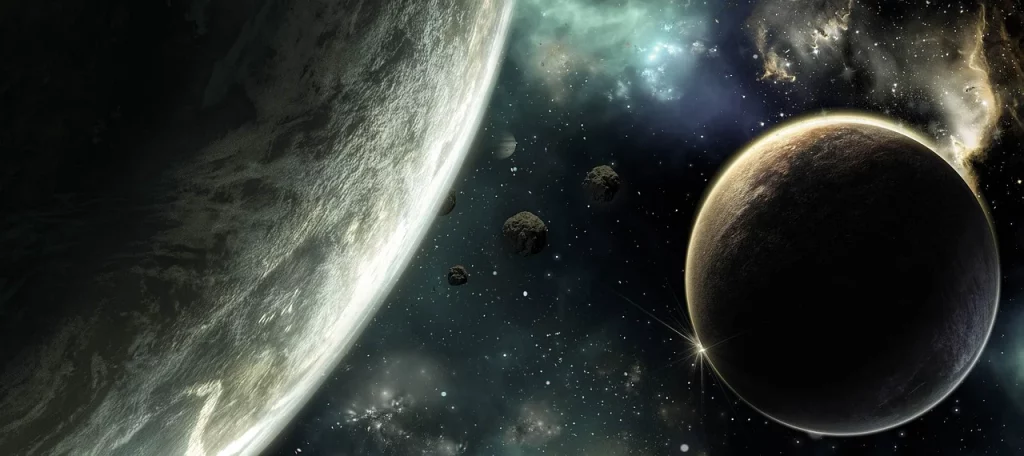Imagine, if you will, a young me, barely tall enough to peek through a telescope, witnessing a shooting star for the first time. That moment sparked what would become a lifetime of asteroid obsession.
Now, with more hours logged star-gazing than I care to admit (let’s just say I’ve spent more time with asteroids than with actual people), I’ve gathered a cosmic collection of 50 asteroid facts.
Did you know asteroids can be fashionably late to their own solar system party? Or that some of them are more indecisive about their orbit than you choosing a Netflix show? Buckle up, space enthusiast, as we embark on a journey through my asteroid adventures and discoveries!
Equipped with his five senses, man explores the universe around him and calls the adventure Science.
Edwin Hubble
Asteroid Facts
Welcome to my cosmic corner, where I unravel amazing facts about asteroids. Be sure to stay focused because there is a quiz at the end of this article that I created to test how good of a reader you are.
- Over 300 asteroids within our solar system have their own moons, showcasing a complex gravitational relationship.
- These cosmic remnants from the solar system’s infancy are more than 4.5 billion years old.
- Giuseppe Piazzi discovered the very first asteroid on January 1, 1801, naming it Ceres.
- Remarkably, some asteroids complete a rotation in just a few hours, far quicker than Earth’s 24-hour rotation period.
- The asteroid belt, sitting between Mars and Jupiter, is home to the majority of these objects.
- Certain asteroids are teeming with valuable metals like gold, platinum, and palladium, potentially valued in the trillions of dollars.
- Near-Earth objects (NEOs) are those whose paths bring them close to Earth, occasionally posing impact risks.
- An asteroid’s hue can indicate its makeup, with darker ones being carbon-rich and lighter shades indicating stone or metal compositions.
- Historic impacts by these objects have significantly influenced Earth’s geological and biological history, including the mass extinction event that wiped out the dinosaurs 65 million years ago.
- In Greek, “asteroid” translates to star-like, a nod to their twinkling appearance when observed through telescopes.
- Though over 1 million asteroids are believed to populate our solar system, only a fraction have been cataloged.
- Their sizes range dramatically, from mere feet to several hundred miles in diameter.
- The Yarkovsky effect can subtly alter an asteroid’s path; this is caused by the emission of heat as the object spins, providing a gentle push over time.

- Contrary to popular cinematic portrayals, the asteroid belt is sparsely populated, allowing for the safe passage of spacecraft.
- The Earth’s largest known impact crater, located in South Africa and named the Vredefort crater, was formed over 2 billion years ago by such an impact.
- Apollo asteroids are those whose orbits intersect with Earth’s, drawing close scrutiny from astronomers for potential hazards.
- Extracting water and minerals from NEOs for use on Earth and in space exploration is a future possibility with asteroid mining.
- These celestial bodies vary widely in composition, from icy objects to those predominantly made of rock or metal.
- About 15% of NEOs are binary systems, where two asteroids orbit each other.
- Trojan asteroids are caught in a planet’s orbit, residing in stable gravitational zones known as Lagrange points.
- The Chicxulub crater in Mexico is believed to have been created by the impact that led to the dinosaurs’ extinction.
- Based on their spectral characteristics, asteroids are categorized into types such as C-type (carbonaceous), S-type (silicaceous), and M-type (metallic).
- The Japanese spacecraft Hayabusa’s visit to asteroid 25143 Itokawa marked the first successful return of samples from an asteroid to Earth.
- Some have orbits that take them on long journeys through the solar system, only to return close to the sun.
- The Almahata Sitta meteorite, which landed in Sudan in 2008, was the first asteroid to be tracked in space before it hit Earth.
- Techniques to deflect a potential collision include kinetic impactors and gravity tractors, aiming to nudge the object off its Earth-bound trajectory.
- When these objects collide in space, they can break apart, forming meteoroids that light up as meteors upon entering Earth’s atmosphere.
- Japan’s space agency, JAXA, has led asteroid exploration efforts, with its Hayabusa missions returning precious samples back to Earth.

- By examining impact craters on Earth and the Moon, researchers can piece together the impact history and assess future threats.
- Objects known as “Earth grazers” skim through Earth’s upper atmosphere before heading back into space.
- Global and space-based observatories collaborate to detect and monitor these objects.
- The Dawn mission uniquely orbited two extraterrestrial bodies, Vesta and Ceres, providing detailed insights into their nature.
- They act as time capsules, preserving the early solar system’s conditions and materials.
- NASA’s Osiris-REx mission is set to bring back samples from Bennu, which could unlock secrets of our solar system’s origin.
- The reflectivity (albedo) of these objects can significantly influence their visibility from Earth and their surface temperature.
- The asteroid Apophis was once considered a potential threat for a 2029 impact, but has since been cleared of posing any danger.
- Aside from posing risks, these objects could serve as stepping stones for human expansion into the solar system, offering up resources for future missions.
- Mars’s moons, Phobos and Deimos, are thought to be captured asteroids, given their composition and irregular shapes.
- The Hayabusa2 mission utilized a small carry-on impactor (SCI) to create an artificial crater on an asteroid, exposing subsurface materials for study.

- Studying these space rocks offers insights into planetary defense by understanding their structure and composition.
- The International Asteroid Warning Network (IAWN) coordinates global efforts to identify and respond to asteroid threats.
- Asteroid 16 Psyche is intriguing for its metallic nature, suggesting it could be the exposed core of a former protoplanet.
- The mass of material within the asteroid belt is just a small fraction of the Earth’s mass, challenging the misconception of a densely populated region.
- June 30th, known as Asteroid Day, commemorates the Tunguska event, the most significant asteroid impact event on Earth in recent history.
- With advancements in technology, the pace of asteroid discovery has accelerated, adding thousands of new objects to catalogs annually.
- Objects classified as “potentially hazardous” are closely watched due to their size and proximity to Earth’s orbit.
- Human missions to these celestial bodies may soon become a reality, opening new frontiers for exploration and scientific discovery.
- Analyses of collisions between these objects help scientists model the solar system’s formation and evolutionary processes.
- The smallest asteroids, known as meteoroids, can be as tiny as a few meters across and often burn up upon entering Earth’s atmosphere, creating spectacular shooting stars.
- Some asteroids are classified as “active asteroids”, exhibiting comet-like features such as tails and comas due to the sublimation of ice or the release of dust.
Asteroid Myths

I hope you enjoyed all these fun facts about asteroids. Now it’s time to separate the myths from the truth in this next cosmic segment.
- Asteroids are Evenly Distributed Throughout Space
Asteroids are not evenly scattered across space. They tend to cluster in specific regions, the most notable being the asteroid belt between Mars and Jupiter. This belt contains millions of asteroids, but they are spread over such a vast area that they are not as densely packed as often imagined. - Asteroids are Always Huge
Asteroids vary greatly in size. While some are indeed huge, spanning hundreds of kilometers, many are quite small, with diameters of only a few meters. It’s like comparing a mountain to a pebble – there’s a wide range of sizes out there! - All Asteroids are Potentially Dangerous to Earth
Not all asteroids pose a threat to Earth. Most asteroids in the solar system never cross Earth’s path. Those that do are closely monitored, and only a very small number are considered potentially hazardous due to their size and trajectory. - If an Asteroid is Headed for Earth, There’s Nothing We Can Do
If an asteroid were on a collision course with Earth, we’re not completely defenseless. Space agencies have been developing and testing various strategies, such as altering an asteroid’s trajectory, to prevent potential impacts. It’s a bit like trying to gently nudge a rolling ball off course. - Asteroids are Lifeless Rocks
Asteroids may not be as barren as they seem. Some contain water, ice, and organic compounds, which are key ingredients for life. Studying asteroids could offer clues about the origins of life and the early solar system, kind of like cosmic archaeologists uncovering ancient secrets.
No products found.
Asteroid Quotes

Let me share with you some of my favorite quotes about asteroids. Let me know if you also have a favorite one in the comments, as I am really happy to know.
The universe is not required to be in perfect harmony with human ambition.
Carl Sagan
This quote by the renowned astronomer and science communicator Carl Sagan reflects on the vast and indifferent nature of the cosmos, implying that events like asteroid impacts are part of the universe’s natural order, indifferent to human plans or desires.
Dinosaurs are extinct today because they lacked opposable thumbs and the brainpower to build a space program.
Neil deGrasse Tyson
This humorous yet thought-provoking quote by astrophysicist Neil deGrasse Tyson suggests that the extinction of dinosaurs due to an asteroid impact highlights the importance of space exploration and understanding cosmic threats.
I’m just a bit fascinated by the stars and by the universe, and by what makes it all go around.
Brian May
Brian May, the guitarist of the band Queen and an astrophysicist, expresses his fascination with the universe, including its mysterious elements like asteroids and their orbits.
In the long, fierce struggle for freedom of expression, the telescope and the microscope have been the staunchest allies of the human mind.
Annie Jump Cannon
Annie Jump Cannon, a pioneering astronomer, emphasizes the role of scientific tools in expanding human understanding, which includes the study of asteroids and their impact on our knowledge of the universe.
We especially need imagination in science. It is not all mathematics, nor all logic, but is somewhat beauty and poetry.
Maria Mitchell
Maria Mitchell, the first American female astronomer, highlights the importance of creativity in science, a sentiment that applies to the study of asteroids, blending scientific rigor with the awe-inspiring aspects of these celestial bodies.
Asteroid FAQ

Having explored the universe of quotes, it’s time to delve into the FAQs. Read carefully, because the next section is the quiz. I spent quite some time creating it, so don’t disappoint me.
- What is an Asteroid?
An asteroid is a small, rocky object that orbits the Sun, primarily found in the asteroid belt between Mars and Jupiter. Unlike planets, asteroids are smaller and typically irregularly shaped due to their lack of gravitational pull to shape them into a sphere. - Are Asteroids Part of the Solar System?
Yes, asteroids are very much a part of our solar system. They are remnants from the early formation of the solar system, about 4.6 billion years ago, and are primarily found in the asteroid belt, a region located between the orbits of Mars and Jupiter. - Can Asteroids Destroy Earth?
While it’s true that asteroids have the potential to cause significant damage if they collide with Earth, the likelihood of a large asteroid hitting our planet is very low. Most asteroids are small and burn up in Earth’s atmosphere. However, larger asteroids could cause significant damage, which is why astronomers closely monitor Near-Earth Objects (NEOs) for potential threats. - How Are Asteroids Formed?
Asteroids are formed from the leftover building materials of the solar system. After the formation of planets, the smaller chunks of rocks and metal that didn’t merge into a planet were left to orbit the sun. These materials clumped together due to gravity, forming asteroids. - What’s the Difference Between an Asteroid and a Meteor?
An asteroid is a small rocky body that orbits the Sun, mainly found in the asteroid belt. A meteor, on the other hand, is what we call an asteroid or a fragment of an asteroid when it enters Earth’s atmosphere and burns up, creating a streak of light in the sky. If it survives the journey through the atmosphere and lands on Earth, it’s then called a meteorite.
No products found.
Asteroid Trivia

It’s your time to shine. Fail to answer these asteroid questions correctly, and you might just find your luck going the way of the dinosaurs. Let’s hope your quiz skills aren’t extinct!
Conclusion
In conclusion, asteroids are more than just potential Earth-smashers; they’re the quiet observers of the cosmos, the original space influencers, if you will. They’ve been around the block (or the solar system) more times than we can count and have seen things we can only dream of.
Remember, without these rocky relics, we wouldn’t know half of what we do about our solar neighborhood. So next time you hear about an asteroid, give a little nod to these cosmic wanderers. And just for fun, if you could send a message to an asteroid, what would you say? Let me know in the comments – the wackier, the better!
5 Sources Used For This ArticleAsteroid Belt | Definition, Location & Facts – Study
Asteroid belt – Space Fandom
Meteorites, Impacts, and Mass Extinction – Tulane
What are asteroids? – Space


